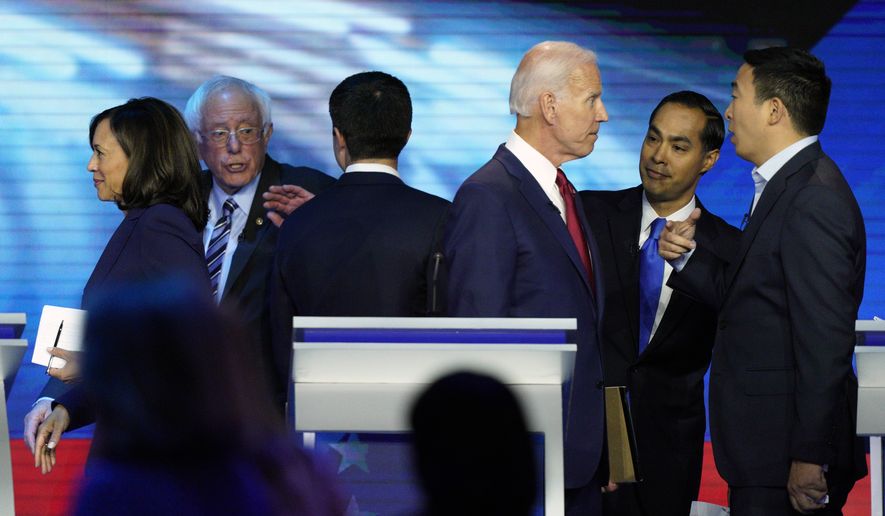Last night was Round 3 of the Democratic Primary Debates, with ten qualified candidates in the running. Each candidate had two main goals: to connect with more voters than anyone else, and to convince those voters that they (the candidate) would have the best chance of beating Donald Trump this time next year, an area in which nobody effectively stole the show.
Sure, each candidate had some good moments, but they also had individual polishing to do in other areas: For example, Yang was a human metronome, perpetually shifting his weight from foot to foot as he talked; Sanders sounded like he had phlegm in his throat all night, and Klobuchar’s overall debate image is still generically “nice.” In this context, such little details can be subconsciously off-putting for viewers and detrimental to gaining popularity.
However, as I mentioned earlier in the week, the key to meeting those two goals would be based on who came across as most MEMORABLE in their debate performance. In particular, being (the right kind of) “memorable” at this stage could be achieved if they remembered to include three kinds of information:
1. Refrain-style sound bite campaign promises (that were “tweetable and repeatable”)
2. Personal stories (to make the candidate relatable and therefore likable), and
3. A Call to action at the end.
So how did it pan out?
First, as far as campaign promise sound bites, some were pithier than others, and although a lot of candidates listed specific promises ranging from eliminating our energy dependence on fossil fuels (O’Rourke), or raising teachers’ salaries to a minimum of $60,000 nationwide (Sanders), to guaranteeing access to healthcare (everybody) or giving $1,000 per month to every American (Yang), most lacked two things:
One is saliency: each promise was mentioned once in passing and embedded in a litany of other ideas. None was a repeated refrain, elevated as a fundamental “If you don’t remember anything else, remember this” levels of priority. Think of it this way: If you’re going to the grocery store and someone asks you to buy three things, chances are you will remember them; if they rattle off twelve things, you probably won’t remember any of them.
This was one of the most effective strategies in Donald Trump‘s 2016 campaign with expressions like “make America great again,” “build a wall,” and “repeal Obamacare,” which he repeated over and over again; even people who didn’t like him can still recite them easily today. I guarantee he will do this again in 2020, and any opponent who does not have a clear refrain of a handful of “tweetable and repeatable“ campaign-defining promises will already start out behind the proverbial eight ball.
Second, regarding use of personal stories, the format of Round 3 actually promoted this: the closing statement round was replaced with a question for each candidate to share a personal story about overcoming professional setbacks. Since it was teed up so well, all candidates made contact with the ball one way or another, so to speak. There were however a few who managed to hit it out of the park while others just rounded some of the bases.
As part of a “good, better, best” comparison, some of the candidates who’s final stories were in the “good” category included Bernie Sanders who focused his story on his political career, losing initial races and eventually coming out on top, and Andrew Yang’s story of multiple failed start-up businesses before finally being successful in business. Both implied the “never give up” theme: It is familiar to everyone, but doesn’t necessarily make you sit up and take notice.
Some that were “better” included Pete Buttigieg who shared a moment of vulnerability in describing his decision to “come out” (as gay) in the middle of an election cycle, and Kamala Harris who was always underestimated as a black woman and told that things “can’t be done,” but not letting it stop her. Unsurprisingly, Kamala Harris, Elizabeth Warren and Amy Klobuchar‘s stories were all gender-related. All of these were inspiring, touching and relatable, and these kinds of stories will hit home with people of similar demographics, but it’s harder to predict how they will land with others, or even how it will allow any one of them to get more traction than the other two.
But the “best” ones really sucked you in. Cory Booker probably won the storytelling award from a quantity perspective, as he regularly illustrated his points with snippets of dialogue (a great rhetorical device) between him and other key people, allowing listeners to imagine themselves in each moment.
Beto O’Rourke was also given an extra boost this evening because so many of the questions lent themselves directly to the opportunity to talk about the shooting in El Paso, which is still fresh experience for the whole country. He did this very passionately and authoritatively, and most of his counterparts on stage even took a moment at some point in the evening to praise how he had handled the situation.
But Joe Biden stole the show for a quality story, despite a couple of dubious false starts, with the most heart-wrenching tragedies regarding the deaths of his first wife, daughter, and son. It’s a personal tragedy sequence that would make it hard for most people to get out of bed every day. It was humble and relatable and for just a moment, you forgot you were listening to a debate. That’s a winning story.
Finally, in an interesting twist, only ONE person had a call to action. As we just mentioned, unlike in the first and second rounds of debates, this time there was no closing statement round, which would have been the natural place for a call to action.
However, all of the candidates did know about this format change in advance, so they all should have figured out how to weave a call to action into that personal story in the last five seconds, to leave viewers with a clear, simple, immediately completable instruction of what they needed to do as soon as the debates were over. If people complete an action that helps you, they feel more invested in you, and are more likely to support you moving forward, bringing others with them. Most failed completely in this regard.
The only person who DID successfully beat the system was Andrew Yang. Political pundits panned it as a gimmick but I thought it was a very smart “outside the box” move. Yang effectively “gamified” his Freedom Dividend proof of concept in a call to action by personally offering ten families $1,000 per month for a year with the pitch, “If you personally believe you can solve your own problems better than any politician, go to Yang2020.com and tell us how $1,000 per month will help you do just that.”
It not only has great “bait,” (who doesn’t think they’re smarter than politicians?) but since it’s a competition, it inspires people to be as passionate as possible in their efforts to explain how this gift will make their lives better, thereby creating an anthology of case studies he will now own and extol as evidence that his plan is really what Americans need and want….and hopefully ten case studies that demonstrate before-and-after lifestyle transformations. Very powerful, and the kind of thing people will keep talking about. Tweetable? Somewhat. Repeatable? Absolutely – watch any talk show today for proof.
Shame on nine out of ten candidates for missing this opportunity.
Overall, each candidate had moments in which they gained and lost inches, but nobody launched ahead. The candidate who can get their campaign-defining refrains together, consistently tell compelling stories and call people to act will be the one to leap to the forefront, and have the best shot at leaping to the presidency.
Let’s see if they figure it out by October.
It's NOT about policy: Winners and losers from last night's #DemDebate will emerge from who was most memorable in three key areas: (1) Who had the simplest campaign promise sound bites, (2) Who told the best stories, and (3) Who had the best call to action. Who were the real winners and losers? It's not who the pundits think. Here's why.
#election2020 #publicspeaking #influence #leadership #communication #executivepresence #politics #joebiden #berniesanders #elizabethwarren #kamalaharria #andrewyang #betoorourke #petebuttegeig #amyklobuchar #juliancastro #corybooker



